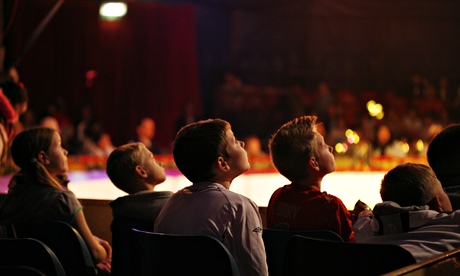
Do children need to be taught how to behave in the theatre? Over at the Stage website, Susan Elkin is calling for theatre etiquette lessons for children after experiencing a performance of the RSC's First Encounter production of The Taming of the Shrew at a school in Kent. Apparently there was a great deal of raucous disruption during the performance.
If you're a regular theatregoer, you will almost certainly have experienced some kind of disruption by other audience members at some point. Often it's the adults, not the children, who are badly behaved. I have seen adult audiences bristle at the arrival of a school party at the theatre, as if they resent the intrusion of young people into what they see as an adult-only arena. It's a far cry from the welcoming environment at theatres in other countries, where adults and children happily share the space.
Do parents need the etiquette lessons instead? Particularly at shows for the very young, some seem to treat the show as babysitting instead of art, and happily play on their mobile phones and even chat to each other while their toddlers storm the stage. I once heard an outraged mother complain vociferously when an usher attempted to stop her child wandering over the stage, saying he was only "being inquisitive".
Of course, some of the best children's work, by companies such as Fevered Sleep and Oily Cart, embraces that inquisitiveness, but there are plenty of theatre shows for the very young that incorporate the fourth wall, and even if the average four-year-old has never encountered the concept, you're never too young to learn.
Elkin's RSC experience (she makes it clear that generally she finds children well prepared by teachers at such performances) might have been exacerbated because the children were on their home territory rather than in a theatre, and therefore had fewer inhibitions. It might also be because the production incorporates cross-dressing.
But my own experience often tells me that if children misbehave at the theatre it is often theatre's fault, not the children's. Kids are the most demanding audience because they tend to respond entirely honestly to what they are seeing. Their behaviour is not mediated by cultural conditioning that says you should behave in a certain way in a certain place. I have seen raucous audiences comprised of teenagers fall entirely silent as the magic of a show takes hold. I recall a brilliant production of A Midsummer Night's Dream by Improbable, involving a sticky-tape forest, that when it began could barely be heard, such was the noise in the auditorium – but which after 10 minutes had conjured the kind of silence that makes it feel as if everybody is holding their breath.
On the other hand, I've also seen a low hum of boredom in a theatre grow and become disruptive. Yes, sometimes it's poor manners, or perhaps simple ignorance about the unwritten rules of theatre (although those rules are increasingly changing as companies abandon the theatre building and set up new rules of engagement via immersive or promenade work). Or it could just be a post-interval sugar rush (I blame the giant bags of sweets sold in many theatres). But often it's a justified response to a really rather dull piece of theatre that keeps on doing what it's doing even when it is quite patently failing to engage its young audience.
Of course politeness and good manners have their place in the theatre (as they do in everyday life), but too much politeness, combined with the insistence of teachers and parents that it must be good just because it's theatre (even when it's quite clearly not), is what turns kids off going to the theatre, perhaps for good. I'm certainly not advocating rotten tomatoes, but whatever their age, I'd opt for noisy and engaged audience members any day over viewers poleaxed with indifference.







